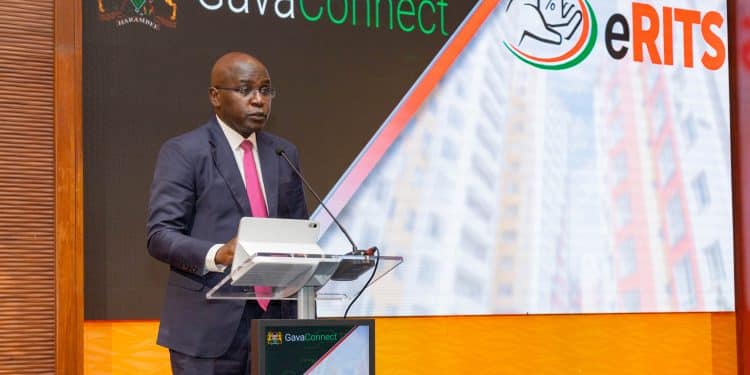The Kenya Revenue Authority (KRA) has unveiled an Electronic Rental Income Tax System (eRITS) to foster voluntary compliance among landlords and property owners.
The system, built on KRA’s Enterprise Integration Platform Gava Connect, is set to streamline compliance for the real estate sector from a technology perspective.
Speaking during the launch, National Treasury Principal Secretary (PS) Dr. Chris Kiptoo hailed the launch of the new system as a significant milestone in the Government’s commitment to ensuring a fair and efficient tax system that will contribute to national development.
PS Kiptoo Urges Landlords to Embrace KRA New Tax System
He added that the system aims to not only increase revenue collection but also to foster a more equitable and predictable tax environment that benefits both taxpayers and the government.
“The government is committed to ensuring that the tax system remains fair, and that compliance is as seamless as possible. With eRITS, we are moving towards a smarter, more efficient tax system that benefits everyone,” he said.
PS Kiptoo also urged landlords to embrace the eRITS platform and comply with rental income tax regulations, emphasizing that the initiative goes beyond revenue collection — it’s about nation-building.
He noted that the taxes collected will support critical sectors such as healthcare, education, infrastructure, and security, ultimately improving the quality of life for all Kenyans.
“The eRITS will enable the registration of landlords and rental properties in a streamlined and comprehensive manner, simplify tax filing processes for landlords, making compliance easier. This will in turn enhance voluntary tax compliance,” he added.
“With this system, we aim to not only increase revenue collection but also create a more equitable and predictable tax environment that benefits both taxpayers and the government.”
Also Read: KRA Announces Industrial Attachments with Ksh7K Monthly Stipend
His remarks were echoed by the Housing Secretary of the State Department of Housing and Urban Development, Athman Said who opined that the real estate sector is now poised to be a major contributor to Kenya’s overall development through tax revenue.
KRA Launches eRITS to Ease Tax Filing for Landlords and Property Agents
On his part, KRA Commissioner General, Humphrey Wattanga said the system is a voluntary compliance tool that aims to support and enhance tax compliance among rental property owners and agents.
Additionally, he mentioned that the system reflects KRA’s commitment to service excellence, efficiency, and continuous improvement.
“eRITS is designed to enable seamless integration with the KRA ecosystem for purposes of tax computation, filing, and payment; and is accessible through the Gava Connect API portal for system-to-system integration, and as a service through the eCitizen platform,” he said.
At the same time, Wattanga stated that the intention is to augment voluntary compliance within the sector while reducing administrative burdens associated with taxation.
“With this launch, we are taking a bold step toward a future where tax compliance is not a burden but a shared responsibility for nation building,” he added.
Also Read: KRA to Auction South Sudan Bound Goods Worth Millions
Introduced in 2016, the Monthly Rental Income (MRI) is applicable to landlords earning between Ksh 288,000 and Ksh 15 million annually.
The MRI tax rate was reduced from 10% to 7.5%, from 1st January 2024, demonstrating the Government’s commitment to easing the burden on taxation among taxpayers.
In the last financial year 2023/2024, tax revenues collected through MRI stood at Ksh 14.4 billion, translating to a 5.2% year on year growth compared to a collection of Ksh 13.6 billion and Ksh 12.3 billion in the previous financial years.
Follow our WhatsApp Channel and X Account for real-time news updates.











































































